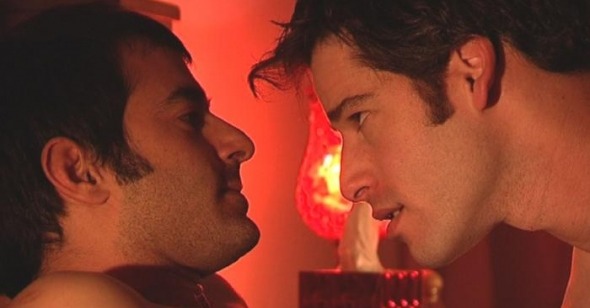Close Encounters
by Michael Koresky
Antarctica
Dir. Yair Hochner, Israel, Regent Releasing
One can’t accuse director Yair Hochner of not giving his target audiences what we want: in the opening fifteen minutes of the Israeli filmmaker’s ensemble dramedy of hook-ups and hang-ups among a small group of gay men in Tel Aviv, he fills the screen with all manner of groping titillation. As one eye-catcher (Ofer Regirer) plows through a succession of one-night-stands, Hochner dissects the screen into boxes, temporally overlapping one another, allowing for a flurry of casual indulgence; there’s no music to accompany this man’s seemingly endless dalliances, just heavy breathing and the occasional clipped conversation.
We can tell time is moving quickly, as in between the trysts, our golden boy is glimpsed primping: some naked sit-ups here, some trimmed pubes there, shower after shower. The opening of Antarctica is effective not only for its thrusting the viewer into an admittedly hot but disorientingly impersonal landscape of anonymity but also for its surprising misdirect: this lothario, named Boaz, turns out to be, at best, a minor character in Hochner’s tapestry. It’s the five hook-ups, seen largely in long shots or shadowy hallways, in various states of obscuring undress, that the filmmaker is most interested in.
Thankfully, despite early intimations to the opposite, Hochner’s film is not a tract detailing the horrors of casual sex: indeed there’s a laidback sexual permissiveness that gives Antarctica its drive and likeability. Wielding a video camera with intimacy and precision, Hochner gets close to the frustrated desires of his male characters. Antarctica is unapologetically horny, even as it wears its romanticism on its sleeve. Most reflective of this split is adorably bespectacled librarian Omer (Tomer Ilan), the de facto protagonist due to his bookish chasteness and fussy moral center, who’s nevertheless not above engaging in meaningless sex. After the depiction of Boaz’s many conquests (of which Omer was the one that got away, due to a cat allergy), the film picks up three years later, on the occasion of Omer’s thirtieth birthday, an event around which the film’s cast of dark-eyed lookers revolve like satellites.
Unfortunately, Hochner adds to this already overstuffed ensemble a few too many dead ends. In a bid for equal opportunity queer correctness, he gives Omer a lesbian sister, Shirley (Lucy Dubinchik), the more domestic-minded sexual pursuits of whom the director obviously has less interest in, judging by the lack of sensuality and frankness with which he depicts them (another added downside to the already awkwardly grafted-on subplot: a succession of narcotizing English-language lesbian coffee-house guitar songs). Additionally, Hochner’s casting of drag queen Miss Laila Carry in the role of Omer and Shirley’s nosy mother, in an evident homage to Divine, sticks out like a sore thumb, as though left over from some far more madcap romp (perhaps the same one from which this film’s leaden “the aliens are landing” tangent comes—don’t ask).
Despite spreading itself too thin, however, Hochner’s film (its title invoked during one lover’s rhetorical plea to another of “would you leave everything and come with me to Antarctica?”) more than fulfills its promise as a lighthearted glide through a handful of heaving Tel Aviv bedrooms. Hochner’s premise—there’s quite a bit of coincidence in the film’s increasingly far-fetched pairings between the handsome cast members, of which Guy Zo-Aretz as dashing journalist Ronen and Yiftach Mizrahi as timid dancer Danny deserve special mention—is hardly fresh at this point, but as a filmmaker he manages to convey a joyous, unforced abandon. Like his characters, he’s hardly playing it safe.
